Wer früh stirbt, hat noch ein langes Leben vor sich.
So lautet ein altbekannter Aphorismus im Showbusiness. Auf Janis Joplin,
Jimi Hendrix, John Lennon oder auch Elvis Presley trifft dieser Spruch fraglos
zu, und auch auf Nick Drake lässt er sich anwenden. Der Sänger
und Songschreiber aus Großbritannien war zu Lebzeiten kaum einem Menschen
bekannt, und die drei Alben, die er in der kurzen Zeitspanne seiner Musikerlaufbahn
aufnahm, verkauften sich damals auch nicht besonders gut. Als der scheue
und stets von psychischen Problemen geplagte Liedpoet dann im November 1974
an einer Überdosis Antidepressiva starb, begann allerdings langsam
sein Weltruhm.
Seine Gefolgschaft wuchs von Jahr zu Jahr, er wurde immer populärer
und inzwischen sind seine Werke längst als bahnbrechende Meilensteine
des Britfolk anerkannt. Seine Alben Five Leaves Left (1969), Bryter Layter
(1970) sowie Pink Moon (1972) liegen mittlerweile als Wiederveröffentlichungen
auf CD vor und wurden hierfür von Drakes damaligem Produzenten Joe
Boyd (Fairport Convention) klangtechnisch generalüberholt.
Auf seinem Debüt-Opus erleben wir den seinerzeit gerade einmal 21-jährigen
Künstler als einen grüblerischen Einzelgänger, der unter
Selbstzweifeln, Einsamkeit und Entfremdung leidet. Er spielt hier mit
Unterstützung von Pentangle-Bassist Danny Thompson einen schwermütigen
Akustikfolk, reichert seine Songs mit Barockstreichern an und singt dazu
in eingängigen Melodien von seinen Identitätskrisen, der eigenen
Sterblichkeit und depressiven Stimmungsqualen. Diese stillen Lieder sind
durchgehend todtraurig und doch kann man sich ihnen einfach nicht entziehen.
Ihr sensibler Zauber wirkt bis zum heutigen Tage fort.
(Harald Kepler, amazon)
|
| During his life-time, Nick Drake sold only a small amount
of records and played only a handful of concerts. His rise to prominence
in terms of reputation has been slow and gradual through the years. Word
of mouth helped his standing grow in England, a compilation or two for the
benefit of new generations. A TV advert recently in America brought this
most English of singer songwriters an amount of popularity world-wide. His
early tragic death has frozen him in time, of course. A shy, sensitive depressive
born with a skin too few. A soft, caressing voice over hypnotic folk and
jazz influenced guitar patterns. Little matter that Nick was actually a
happy child, growing up in a close family, and any form of depression only
really set in during the final three or four years of his life. Another
effect of being frozen time is being taken for granted - that the guitar
style Nick spent hours upon hours upon hours practising and perfecting -
was somehow a lucky twist of fate born into the world when Nick was. He
was blessed with natural talent of course, but days on end spent merely
tuning his guitar, playing figures and patterns, re-tuning, just snippets
that would later form the basis of songs. Nicks guitar playing is sometimes
overlooked when there is so much else on display through the poetic lyrics,
a gorgeous voice and the mystique surrounding his short time in this world.
The fact is, as well as all of those things, the guitar style of Nick was
completely unique to him, and has been unrepeatable since.
Opening with 'Time Has Told Me' is perfect, a wonderful way to open a
debut album, a statement of intent. All the Nick Drake trademarks are
present and correct. A lovely, lilting melody. Rich, deep and romantic
vocals. The guitar truly is hypnotic, I could just listen to that guitar
pattern over and over, all day long. 'River Man' which follows is bordering
on genius. The sound of Nick and acoustic is enhanced here by tasteful
string arrangements that sweep past and perfectly suit the melodies and
vocal lines. Nick sounds especially alluring and mysterious vocally through
this song. The lyrics are poetry and everything is just perfect. The guitar
is amazingly strong for acoustic guitar playing. 'Three Hours' was written
for a friend of Nicks. The lyrics are ever so slightly mysterious in their
poetry. So much so, that same friend didn't have the faintest idea what
the song was actually about. So, what chance the rest of us?! It hardly
matters, the words sound good when sung, the playing and singing as strong
and melodic as ever. 'Way To Blue' ditches the guitar entirely to concentrate
on orchestrated backing to highlight Nicks voice. A sad, beautiful and
mournful melody. Lyrics that sound so full of loneliness. So very lonely,
and going straight for the heart. Makes you want to hug somebody to comfort
them. So, powerfully strong emotionally, then? Well, yeah. Music works
best expressing the range of human emotions. But Nick expressed particular
emotions through 'Way To Blue' that perhaps have never been expressed
better by anybody else in music. And, that's some compliment. The guitar
returns for 'Day Is Done', a short little song to carry on from 'Way To
Blue' in a sense - but comes across more as a song of resignation. It's
no less beautiful for it though, and the string arrangements are something
else.
We were talking about emotions? Well, 'Cello Song' has a fair few for
you! A life-affirming joy, Nick sounds happy, the song full of a particular
energy bringing to mind a morning breaking in spring-time. It contrasts
with Nicks image of being perpetually Autumn. Early in the song he sings
'you have nothing to fear...' which is kind of nice. 'Thoughts Of Mary
Jane' continues the feeling of a hazy spring time, moving onto to a feeling
of spending a late afternoon with someone beautiful in a field of long
grass. 'the way she sings, and her brightly coloured rings....' and his
voice is just, ah..... just, well, so very romantic and touching. A brilliant
little guitar introduction leads into the breezy and jazzy 'Man In A Shed'.
It lacks the romance of other songs, but the performance is as good as
anything else here. 'Fruit Tree' is almost impossible to describe. Nick
sounds wise, lost, in his dying days. The strings are beautiful, the vocal
reaching into your heart and pleading. The guitar goes round, repeating
patterns, but changing them through variation, and the lyrics are some
of the best Nick ever wrote. 'Saturday Sun' rather than 'Fruit Tree' ends
the album. 'Fruit Tree' would have made a rather 'heavy' ending. 'Saturday
Sun' is subtly jazz influenced and utterly gorgeous - like being tucked
into a bed by a loved one. Really, it is! Well, I think so. Maybe you
will too.
(Adrian Denning)
|
| It's little wonder why Drake felt frustrated at the lack
of commercial success his music initially gathered, considering the help
he had on his debut record. Besides fine production from Joe Boyd and assistance
from folks like Fairport Convention's Richard Thompson and his unrelated
bass counterpart from Pentangle, Danny Thompson, Drake also recruited school
friend Robert Kirby to create most of the just-right string and wind arrangements.
His own performance itself steered a careful balance between too-easy accessibility
and maudlin self-reflection, combining the best of both worlds while avoiding
the pitfalls on either side. The result was a fantastic debut appearance,
and if the cult of Drake consistently reads more into his work than is perhaps
deserved, Five Leaves Left is still a most successful effort. Having grown
out of the amiable but derivative styles captured on the long-circulating
series of bootleg home recordings, Drake assays his tunes with just enough
drama — world-weariness in the vocals, carefully paced playing, and
more — to make it all work. His lyrics capture a subtle poetry of emotion,
as on the pastoral semi-fantasia of "The Thoughts of Mary Jane,"
which his soft, articulate singing brings even more to the full. Sometimes
he projects a little more clearly, as on the astonishing voice-and-strings
combination "Way to Blue," while elsewhere he's not so clear,
suggesting rather than outlining the mood. Understatement is the key to
his songs and performances' general success, which makes the combination
of his vocals and Rocky Dzidzornu's congas on "Three Hours" and
the lovely "'Cello Song," to name two instances, so effective.
Danny Thompson is the most regular side performer on the album, his bass
work providing subtle heft while never standing in the way of the song —
kudos well deserved for Boyd's production as well.
(Ned Raggett , All
Music Guide)
|
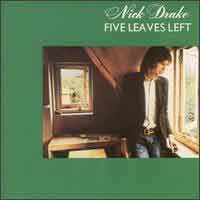
 Inselplatte #5 in Jahresliste
Inselplatte #5 in Jahresliste  Plattentipp
Plattentipp 











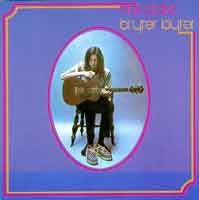
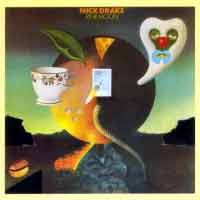
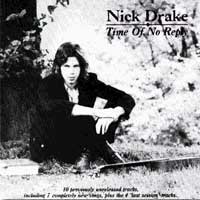
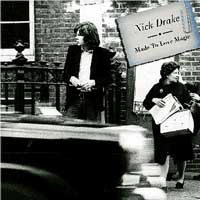





 #55 Virgin/Colin Larkin(2000)
#55 Virgin/Colin Larkin(2000)


 #24 Rookie(2013)
#24 Rookie(2013) eins von 1001 Alben, die Ihr hören solltet, bevor das Leben vorbei ist! (2008)
eins von 1001 Alben, die Ihr hören solltet, bevor das Leben vorbei ist! (2008) 